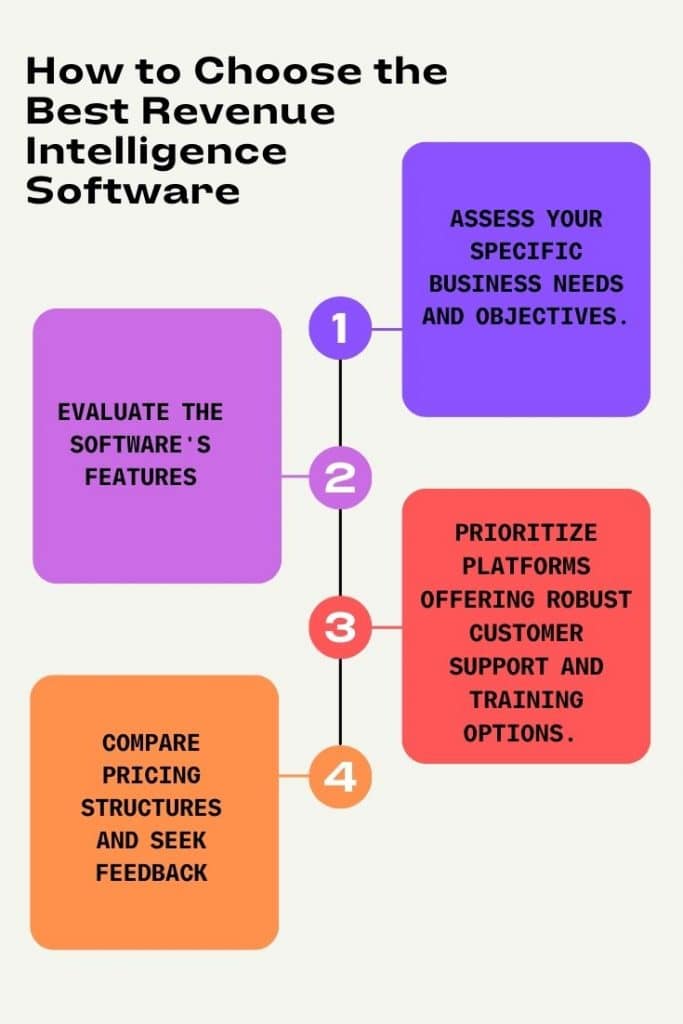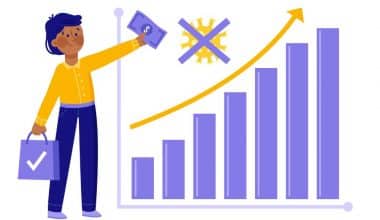One of the things I learned in business recently is that there’s a thin line between data and profitability. Businesses can achieve so much when they harness and analyze the available data. I remember a time when our sales team was flying blind, relying on gut instincts and guesswork to drive revenue. Well, gut instinct isn’t entirely wrong, but it was a hit-or-miss game that often left us feeling frustrated and disheartened at times. Along the way, we learned about revenue intelligence and it’s effectiveness. It was a game-changer that revolutionized our approach to sales and marketing. It also helped us uncover hidden gems of insight that have the potential to reshape the trajectory of any business. Well, it’s like having a supercharged crystal ball that not only predicts future revenue streams but also guides you on the most strategic path to get there.
With revenue intelligence, you’ll be armed with actionable insights that will give you a competitive edge in the market, regardless of your industry. You’ll know who your target audience is, what they want, and how to reach them effectively. Today, I have one aim, and that is to help you uncover what revenue intelligence is and, its diverse benefits, from supercharging sales performance to enhancing the customer experience. Lastly, we’ll shine a spotlight on the top software solutions that are presently leading the charge in revenue optimization.
Key Points
- Revenue intelligence is a strategic approach to using data and insights to optimize revenue generation processes within a business.
- Generally, it involves gathering, analyzing, and leveraging various data types to make informed decisions that drive revenue growth.
- Its primary goal is to provide guidance on closing deals and generating revenue through real-time conversational intelligence data. This is achieved through the collection of data from various sources.
- To choose the most suitable revenue intelligence software for your business, you need to assess your specific business needs and objectives. Afterward, evaluate the software’s features and prioritize platforms offering robust customer support and training options. Lastly, compare pricing structures and seek feedback from peers or industry experts to make an informed decision.
- Salesforce CRM Analytics, Salesloft, Gong, Clari, Xactly, and so on, are some of the most renowned revenue intelligence software programs presently.
Revenue Intelligence and What It’s About?
Revenue intelligence is a strategic approach to using data and insights to optimize revenue generation processes within a business. It involves gathering, analyzing, and leveraging various data types to make informed decisions that drive revenue growth.
Let me use a scenario to ensure you fully grasp this. Let’s assume your business is a vast network of interconnected roads in a bustling city. Then, revenue intelligence is the GPS that guides you through the maze of the streets. For what purpose? It’s just to ensure you navigate efficiently and reach your destination faster. Just as a GPS collects real-time traffic data to suggest the fastest routes, businesses gather and analyze data from various sources—sales, marketing, and customer feedback—to identify the most lucrative paths to revenue growth.
Moreover, similar to how a GPS provides alternative routes in case of traffic jams or roadblocks, businesses develop contingency plans and adapt their strategies based on changing market conditions or unforeseen challenges.
In essence, intelligent revenue growth equips businesses with the navigational tools they need to chart a clear path forward, adapt to changing landscapes, and ultimately arrive at their destination of increased profitability and success.
At its core, revenue intelligence combines elements of sales, marketing, and customer intelligence to provide a comprehensive view of the factors influencing revenue generation. This includes understanding customer behavior, market trends, competitive dynamics, and sales performance.
Armed with these, businesses can make data-driven decisions that enhance their ability to attract, retain, and monetize customers effectively. To what end? It’s simply for sustainable revenue growth and competitive advantage.
Why is Revenue Intelligence Important?
Revenue intelligence is important because it enables businesses to have a better understanding of their customers, optimize sales processes, and maximize revenue generation. To put it more concisely, I’ll say it ultimately leads to improved profitability and sustainable growth.
Its primary goal is to provide guidance on closing deals and generating revenue through real-time conversational intelligence data. Revenue intelligence consolidates this information into a unified source of truth by collecting data from various teams, such as sales, marketing, and support.
What are the Features of Revenue Intelligence Software?
Some common features of revenue intelligence software include data integration, data analytics, sales performance tracking, customer insights, forecasting and predictive analytics, pipeline management, competitor analysis, integration with sales and marketing tools, customizable dashboards and reports, AI and machine learning, and so on! These are some of the key features you might find in revenue intelligence software. However, some features and capabilities may vary depending on the provider and the needs of the business.
What is the Work of Revenue Intelligence?
Revenue intelligence primarily involves gathering, analyzing, and interpreting data related to revenue generation within an organization. Generally, this revolves around leveraging data and insights to optimize revenue streams, identify growth opportunities, and mitigate risks. It includes the following:
- Data collection
- Data analysis
- Forecasting
- Optimization
- Risk management
- Performance tracking
- Strategy development, and so on
Key Benefits of Revenue Intelligence
The following are some of the key benefits of revenue intelligence:
#1. Improved Sales Performance
I believe every brand wants to increase sales and revenue, and that’s one of the key benefits of revenue intelligence. To achieve this, revenue intelligence helps sales teams understand customer behavior, preferences, and purchasing patterns. Afterward, they use the information to tailor their approach and message accordingly. This can lead to higher conversion rates and increased sales.
#2. Data-Driven Decision Making
Data is part of our daily lives, and you’ll agree with me that being able to adequately analyze it gives you an edge over competitors. With revenue intelligence, businesses are empowered to make data-driven decisions by providing actionable insights derived from comprehensive data analysis. This reduces reliance on intuition and guesswork, leading to more informed and effective decision-making across the organization.
#3. Enhanced Customer Experience
I’m a digital marketer, and being able to give customers an amazing experience means they’ll turn to returning customers and also tell others about your brand. Unfortunately, you won’t guarantee a good customer experience unless certain things are in place. This is where revenue intelligence comes into play. First, it gives you deeper insights into your customer needs and preferences and helps you narrow down your leads. As a result, businesses can provide more personalized and targeted experiences. This leads to higher levels of customer satisfaction and loyalty.
#4. Streamlined Operations
By integrating revenue intelligence into various business processes, organizations can streamline operations and improve efficiency. This includes automating repetitive tasks, optimizing workflows, and eliminating bottlenecks.
#5. Better Forecasting and Planning
Revenue intelligence enables businesses to forecast sales more accurately by analyzing historical data and identifying trends and patterns. This helps in better planning and resource allocation.
#6. Identifying Growth Opportunities
Through revenue intelligence, businesses can identify untapped market segments, new product opportunities, and areas for expansion. This allows for more strategic decision-making and helps businesses capitalize on growth opportunities.
#7. Reduced Churn and Increased Retention
By understanding customer behavior and preferences, businesses can proactively address issues and concerns, ultimately reducing customer churn. Revenue intelligence helps in identifying at-risk customers and implementing targeted retention strategies.
#8. Optimized Pricing Strategies
Revenue intelligence provides valuable insights into what price points customers are willing to pay for products or services. By analyzing market data and competitor pricing, businesses can optimize their pricing strategies to maximize revenue while remaining competitive.
Revenue Intelligence Software
Revenue intelligence software (RIS) refers to a category of technology solutions designed to help businesses optimize their revenue generation processes. These platforms typically leverage advanced analytics, artificial intelligence, and machine learning algorithms to gather, analyze, and interpret data related to sales, customer interactions, and market trends.
Revenue intelligence software aims to provide businesses with actionable insights and recommendations to drive revenue growth, improve sales performance, and enhance customer satisfaction. These tools are particularly valuable for sales and marketing teams operating in highly competitive and rapidly evolving industries. Generally, tons of these tools are available, and each comes with diverse features that distinguish them from the others.
The following are some of the best revenue intelligence software:
#1. Salesforce CRM Analytics
Salesforce CRM Analytics is the ultimate ally for sales teams, blending top-notch sales smarts with AI wizardry. With specialized editions like Revenue Intelligence, it’s like having a secret weapon in your arsenal, delivering custom analytics and AI tailored just for your team. It’s not just about crunching numbers; it’s about unlocking the secrets of revenue with the cloud-based analytics muscle of Tableau. With Salesforce CRM, one thing is certain, your sales managers will be diving into dynamic dashboards, uncovering gems of insight, while reps effortlessly pool data from all corners, powering up collaboration and turbocharging sales.
Key Features of Salesforce CRM Analytics
The following are some of the key features of Salesforce CRM Analytics:
- Tableau analytics
- Sales analytics and service analytics
- Revenue intelligence dashboards and AI
- Einstein’s prediction builder
- Einstein’s discovery reporting
- Pipeline inspection
Pros of Salesforce CRM Analytics
The following are some of the pros of Salesforce CRM analytics:
- Salesforce CRM Analytics is easy to use and navigate
- It has a robust AI tool for data visualization and prediction
- It also has enough tools to run revenue analytics and build reports
Cons of Salesforce CRM Analytics
The following are some of the cons of Salesforce CRM Analytic
- Salesforce CRM Analytics is easy to use and organized, which is great but its plan selection is somehow confusing
- It’s relatively expensive
- It’s not beginner-friendly, which means that first-time users will have a hard time getting used to it.
#2. HubSpot Operations Hub
I adore Hubspot for several reasons, the main one being that each piece of software they develop is distinct and perfectly serves the purpose for which it was designed. Hubspot Operations Hub is not an exception. Hubspot Operation Hub offers a suite of operational tools tailored to support sales teams in streamlining app integration, syncing customer and company data, and automating various business processes through programmable automation.
With its sales automation process, your sales team will focus on sealing deals while it analyzes the data that brings in the lead. This means that businesses can customize their sales automation with ease. This is more like using WordPress or Wix to create a stunning website in record time. Another amazing thing about Hubspot Operations Hub is that it allows integration with other apps, which makes your work relatively easy.
Key Features of Hubspot Operations Hub
The following are some of the key features of Hubspot Operation Hub:
- Customizable Automation
- Scheduled Workflow Triggers
- Seamless Data Sync
- Built-in Payment Processing
- AI-Powered Duplicate Management
- Custom Object Management
Pros Of Hubspot Operation Hub
The following are the key features of Hubspot Operation Hub:
- Hubspot Operation Hub has robust automation tools
- It comes with full integration and data sync
- It’s quite easy to set up and use
Cons of Hubspot Operations Hub
Below are some of the key cons of Hubspot Operation Hub:
- Hubspot Operation Hub has full integration and data sync
- It has limited sync documentation
- It has a steep learning curve for complex customization
#3. SalesLoft
Salesloft’s recent acquisition of Drift is making waves in the sales software world, and for good reason. With Drift’s expertise in conversational AI and buyer experience, Salesloft is gearing up to transform the buyer journey entirely. This means delivering a personalized, seamless experience across all channels, aimed at boosting revenue and maximizing customer lifetime value.
For me, what makes Salesloft stand out is its use of cutting-edge AI technology. It’s like having a crystal ball for sales teams, providing actionable insights based on real-time data. Whether it’s understanding buyer responses or tracking online behavior, Salesloft ensures sales professionals are equipped to make smart decisions every step of the way.
But here’s the kicker: Salesloft doesn’t just stop at insights. Its primary focus is driving real results. With Salesloft, sales managers get a bird’s-eye view of key performance metrics, it also empowers them to steer their teams toward success. For sales reps, Salesloft offers a streamlined view of the sales pipeline, helping them focus their efforts where they matter most.
In a nutshell, Salesloft isn’t just another sales tool—it’s a game-changer. By blending AI smarts with powerful workflow optimization, it’s putting the power of revenue generation and customer engagement firmly in the hands of sales teams everywhere
Key Features of Salesloft
The following are some of the key features of Salesloft:
- It has technology and workflow optimization
- It has AI-powered forecasting, which provides accurate predictions for revenue growth
- With Salsloft, your sales team has access to real-time, customizable deals to track leads
Pros of Salesloft
The following are some of the key features of SalesLoft;
- It has a customizable workflow
- It’s quite easy to set up and use
Cons of Salesloft
Below are some of the cons of Salesloft:
- Their pricing structure is not transparent.
- It has limited native CRM integrations
#4. Gong
Gong is a conversation intelligence solution leveraging AI to dissect sales discussions, offering insights to boost sales effectiveness, enhance deal visibility, and identify coaching opportunities. By analyzing call data and seamlessly integrating with various sources, including CRM systems, emails, and other pertinent applications, Gong’s strength lies in converting unprocessed data into actionable intelligence, to enhance sales strategies effectively.
Pros of Gong
The following are some of the key pros of Gong:
- Gong can be integrated with other data sources
- It has powerful data analytics tools
Cons of Gong
The following are some of the key cons of Gong:
- Gong sales-focused orientation
- It is not adapted to individuals
- It has limited transcription capabilities
#5. Xactly
When it comes to getting a complete grasp of your data, Xactly’s Revenue Intelligence solution has your back. From boosting your pipeline performance to nailing down accurate sales forecasts and even comparing your progress with industry peers, Xactly gives you the insights you need to make informed decisions and drive success. With a lineup of four powerful tools – Xactly Forecasting, Xactly Insights, Xactly Benchmarking, and Xactly Connect – it covers all the bases.
Pros of Xactly
The following are some of the pros of Xactly:
- Xactly has a user-friendly interface that’s easy to navigate, even for a beginner. It’s always amazing when a beginner can adapt to a new tool easily.
- It has advanced pipeline visibility, which gives a lot of visibility into the pipeline’s health. With this, the entire team and manager are not caught off guard.
- It’s a complete analytics tool and offers internal and external analysis of your data.
Cons of Xactly
The following are some of the cons of Xactly:
- It’s not meant for individuals. So if you’re an individual, you’d better look for another solution.
- It has some delays, which means you can’t have actual real-time monitoring of your revenues.
- Xactly has limited integration. While Xactly seamlessly integrates with various ERP and CRM systems, it doesn’t directly capture data from meetings or instant messaging services. If you’re looking to analyze data specifically from these sources, you might need to explore other complementary tools.
Others Include
- Tableau Public
- Clari
- Revenue.io
How to Choose the Best Revenue Intelligence Software

The core objective of revenue intelligence software is revenue maximization through AI-driven analytics, gathering usage data from leads, prospects, and customers. Therefore, you must ensure that whichever software you choose covers these.
Aside from that, selecting the ideal revenue intelligence software involves several key considerations. The following steps will help you choose the best software platforms for your business growth:
- First, assess your specific business needs and objectives.
- Evaluate the software’s features, such as deal insights, pipeline analytics, and AI capabilities, ensuring they align with your requirements. Consider factors like user-friendliness, integration capabilities, and scalability.
- Prioritize platforms offering robust customer support and training options.
- Compare pricing structures and seek feedback from peers or industry experts to make an informed decision.
Business Yield’s Checklist For Choosing The Best Revenue Intelligence Software
Revenue What is Intelligent Revenue Growth?
Intelligent revenue growth refers to the strategic and data-driven approach businesses take to increase their revenue sustainably and efficiently. It involves leveraging advanced analytics, technology, and insights to identify revenue expansion opportunities while optimizing existing revenue streams.
The definition above is straightforward, but you need to understand that intelligent revenue growth requires a holistic approach that integrates various aspects of the business. This includes sales, marketing, product development, and customer service, all underpinned by data-driven decision-making. By adopting this approach, businesses can achieve sustainable revenue growth while enhancing profitability and customer satisfaction.
- Best Sales Enablement Tools 2023: (Top 15+ picks)
- MARKETING INTELLIGENCE: Definition, Types, Tools, Strategies & Examples
- Reviews of Top 11 Business Management Software In 2023






